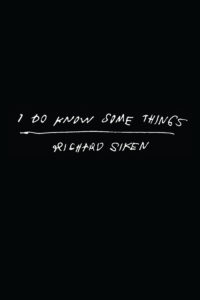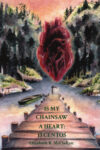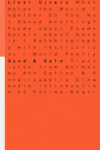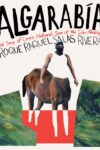
[Copper Canyon Press; 2025]
Richard Siken’s first poetry book, Crush, remains for many its readers one of the most influential books about desire and panic, even twenty years after its publication. His second book, War of the Foxes, is entirely different in its thematic concerns and poetic approach, attentive to the very heart of artistic creation, delving into what the artistic process takes from an artist when art is ultimately turned over to a populace. Siken treats each book as a self-contained artifact. His career is a guidebook to how poets can (and perhaps should) write a book beyond the concerns of the previous. Some poets write the same book in different words several times over, sometimes for their whole careers. Not Siken.
And yet, what I realize after reading Siken’s newest collection, I Do Know Some Things, out now from Copper Canyon Press, is that Siken is a poet with a consistency. His is obsessed with obsession. Whereas the obsession of Crush is love, the obsession of War of the Foxes is the artistic search for truth. His third poetry collection, I Do Know Some Things, is no different in its departure—thematically, stylistically, and in its urgency—but its obsession is mortality. Take, for example, these lines from the book’s first poem, “Real Estate”:
[…] Their names remain on the deed to the house. It isn’t haunted, it’s owned by ghosts. When I die, I will come in fast and low. I will stick the landing. There will be no confusion. The dead will make room for me.
Or these lines from “Patty Melt”:
[…] I was still in a wheelchair when my mother died. I had her cremated. There was nowhere to put the box.
Here, the speaker of the poems perseverates on death. On what death creates, both for those who are dead and those who are left in the dead’s wake. As poems unfold throughout the collection, Siken explores the process of healing after a serious medical event: a stroke.
The stroke occurs in the poem “Sidewalk.” In “Mind Control,” Siken describes a doctor’s assessment, and in “Orbit” moving to a rehab facility. Along the way, readers get a sense of the speaker’s fears: “I was afraid of getting lost. Now I was lost” (“Orbit,” 36). And the collection coalesces around this interrogation of lost and losing, which Siken notes bluntly near the book’s end in “Fauna”: “We have to practice losing everything. We are deer, we are headlights. We are the road where we collide.”
I Do Know Some Things catalogues the fallout of a stroke, specifically loss of speech. For a poet, this is especially a frightening experience. “Dawn” elaborates on this fraught relationship between outward bodily function and inner intention, describing an empty house:
[…] Static. It was nothing but it moved and made a noise. I watched it for a while. I watched it for a long time. There was something sad about it. It didn’t have a story.
Here, Siken extrapolates upon the loneliness of an empty space to mirror the space inside the self. An life cut short by stroke, illness, or early death equates to an unfinished story—something the speaker of these poems just can’t stomach. A fear of isolation permeates the collection. “Sidewalk” opens: “I crawled to the front door and swung it open so the ambulance could find me” (9). In this poem, fear takes center stage as the speaker grapples with not being able to speak: “They asked the wrong questions. I gave the wrong answers. They thought I was faking it. I said Numb. I meant getting numb, more numb, half of me mostly numb.”
Siken also pays dutiful attention to image and description in I Do Know Some Things, which is exemplified in its choice of form: the prose poem. The whole book is prose poems. Because prose poems are block after block of text, a longer book adds risk in keeping readers’ attention, especially for readers less accustomed to prose poetry, but it’s not the case with I Do Know Some Things. Siken’s rich images and poignant descriptions in these poems sustain attention. And I struggle to identify clearly where I might cut poems to tighten the whole, since each poem is both well-crafted and earns its place.
A poetic form that is sometimes misunderstood, laughed at, and glossed over, the prose poem is, in fact, distinct from all other poetic forms. It’s not a block of text into which a poem is tossed. The lines breath as lyric lines do, and its incumbent upon the reader to determine where those breathes fall—which makes sound such an important component of the prose poetry form’s composition.
“Patty Melt” showcases sound through repetition: “I watched cars pull into the parking lot, watched other cars pull out.” In this single line, the repetition of “watched,” “cars” and “pull” all contribute to a cadence that affects readers through the poem’s dance. Add to this Siken’s expert sentence variations, as in the punchy crescendo and conclusion in “Volta” where sentence length contributes to cadence, and readers get a treat of sonic impact:
[…] If you can’t set it down then fall on your knees and feel the weight of it. I was right about everything. If it’s any consolation, I’ll never forgive you. You’re welcome. Let awe end. Just like that. Fair enough.”
A good prose poem should feel intertwined with its subject. There should be no yearning for line breaks. But there’s also space for humor. In poems like “Paragraph,” Siken comments on the prose form:
[…] I didn’t know what to do with it so I put it in a box. I tried to keep it all together but it was multiplicitous, in theory and practice. It was confusing. I tried to say it completely. I said it as plain as I could.
The story of I Do Know Some Things is palpable, welling at every edge with urgency—it’s a book that desires to hook readers in. As such, Siken approaches the prose poetry form with the same intentions as storytelling. One masterclass example of the prose poem is “Driveway,” which ends with these killer lines: “Then, it seemed obvious: Likely there was a third son. Turns out, there was.” (44). Then, later in the collection, Siken pulls off a hat trick and continues that poem from where it left off with another poem, “Horoscope”:
[…] Then, it seemed obvious: Likely there was a third son. Turns out, there was. I already knew him. He was a friend of a friend. He was a bass player in a local band. He was the chiropractor’s wife’s son. He didn’t look like me, he looked like his other brother. I looked like my other brother. Some days we were convinced we were brothers, other days we weren’t.
It’s an interesting extension of a previously appearing poem, reminding me of Ross Gay’s titular poem from Bringing the Shovel Down and the book’s later poem, “Again,” which revises the titular poem in a small, but meaningful way.
Siken’s prose poems are underpinned by their many layers which a reader can unwrap endlessly. While some readers might favor lyric poetry for their inherent layers through line-breaks, Siken replaces this impulse to steer away from a prose poetry collection with these richly developed layers through narrative elements. Take, for example, three poems that together unfold: “Dinosaur,” “Parataxis” and “The Horns.” The first two poems (“Dinosaur” and “Parataxis”) begin with the same beginning line, “My housemate’s girlfriend has a kid who stays with us half the week” (70-72), then the third poem of the trio (“The Horns”) begins, “My housemate no longer has a girlfriend” (76). This narrative arc would otherwise never be told without Siken’s clever placement of them in the collection. Each poem stands on its own without influence from the others, yet when put together, the narrative provides a multifaceted read.
And then there are Siken’s endings to many of his poems. Surprising, punchy, puzzling even. “Word Problems” ends with beautiful catharsis:
[…] It’s exhausting, keeping your eye on the chicken. There’s a fire, there’s a fire. Leave the chicken, leave Alamogordo. Where is your friend? Why are you sad? Let it rain, let it pour. Hallelujah.
This picture makes readers reassess what they’ve encountered, retracing the entirety of the poem. And “Word Problems” is just one example of many. “True Love” ends: “The captain is always silent after the ship goes down. It’s a tragedy, like everything, but the sea is only waist deep. I insist this is a lullaby.” The poem could have ended at “waist deep” and been very fine, but Siken’s addition in insisting the poem is a lullaby adds a puzzling texture to the whole, forcing the reader to re-read it for this new layer of meaning.
I Do Know Some Things is searing, red-hot with urgency and painful remembrance: the death of a mother, an ex-husband, a self through the grieving process, or the loss of bodily function. Siken explores universal fears while also performing new, innovative storytelling in a way I’ve not yet encountered anywhere else in poetry this year—or in the last decade. I Do Know Some Things is Richard Siken’s most impressive and sincere collection of poems yet. It will be a book I study and return to for many years to come.
Daniel Lassell is the author of two poetry books: Frame Inside a Frame (Texas Review Press, 2025) and Spit (Wheelbarrow Books / Michigan State Univ., 2021), winner of the Wheelbarrow Books Poetry Prize. He grew up in Kentucky and lives in Bloomington, Indiana.
This post may contain affiliate links.






